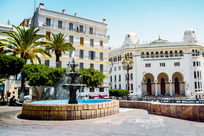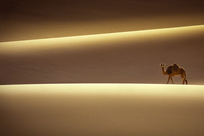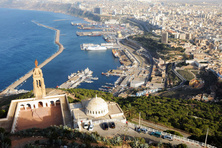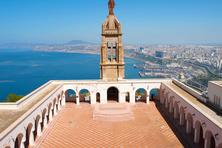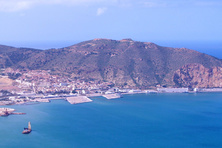Algeria
- Currency: Algerian dinar
- Time: UTC+1
- Languages: Arabic, Berber
- Religions: Islam (Sunni)
- Sections: Get in Visa Customs Cuisine Money Details of interest Popular resorts
Algeria or officially the People’s Democratic Republic of Algeria is a state in North Africa. It borders Tunisia, Morocco, Libya, Niger, Mali, Mauritania, and Western Sahara. The north of the country is washed by the Mediterranean Sea. The capital city is Algiers.
In the north, the climate is Mediterranean subtropical and the rest of the country has a tropical climate. Summer is the best time for travelling to Algeria beach resorts and the period from November to March is good for excursions to the desert.
The official language is Arabic, but some people can also speak Berber and many Algerians speak French. The major religion is Sunni Islam.
In Algeria, you can spend your time on a beach resort, go to excursions to the historical and architectural monuments or enjoy the nature of the country.
The tourism infrastructure cannot compete with the neighbouring Morocco and Tunisia but the absence of the crowds of tourists can be an advantage for some people. In addition to the beaches in the coastal cities, the following resorts have also gained popularity: Sidi Fredj, Turquoise Coast, Zeralda and the beaches in Bejaia Province and Jijel Province. Some places are quite good for diving and if the weather permits for surfing as well.
In Algeria, there are a lot of interesting historical and architectural monuments dating back to the era of Ancient Rome. Many tourists come to the country to get acquainted with the sights situated in the cities of Algiers, Oran, Tlemcen and M’Sila Province, Ghardaia Province, and Setif Province.
Although most of the territory of Algeria is occupied by the Sahara Desert, nature is diverse enough and the tourists can go hiking and horse-riding enjoying the beauty of nature.
Get in
By Plane
There are direct flights from Moscow to Algeria but the cost of the flight is usually very high. The most cost-efficient way is to take a transit flight with a transfer in Paris or Rome. There are direct flights to Algeria from many European countries.
By Land
A trip to Algeria can be a part of your extended trip to North Africa. In this case, you can get to Algeria by bus from neighbouring countries. There is an everyday bus Maghreb express running between Morocco, Algeria, and Tunisia. This is a fast, safe and comfortable way of travelling.
It is safer to come to Algeria by car from Morocco and Tunisia.
By Sea
A ferry route connects Algeria and several ports in Spain and France. Algerian ports accept Mediterranean cruise ships.
Visa
European and CIS tourists must obtain a visa to travel to Algeria. The normal time for processing the documents for a visa is five working days, but be aware that the Algerian Ministry of Foreign Affairs is notorious for its bureaucracy and this time can extend to two weeks.
It is prohibited to visit the southern regions of the country, even if you have a visa. The authorities can refuse to issue the permit to the tourists who express their intention to visit the southern regions.
If you are planning to enter Algeria by your own car or a bike(as a participant of the African motor rally), you should undergo a special procedure to obtain a permit.
You can submit the documents for a visa personally or through a trusted person.
Customs
The legislation of Algeria allows anyone to import and export foreign currency without any restrictions, but it is necessary to indicate the money on the declaration form. At the Customs, the tourists must exchange some of their money for dinars (DZD). One should buy, at least, 1.000 DZD. The export of currency is limited to the amount indicated on the declaration form. Precious metals jewellery and other valuable goods are subject to declaration.
The tourists can import the following goods duty-free:
- some alcohol and tobacco;
- perfume for personal use;
- personal jewellery;
- photo and video cameras for personal use.
It is prohibited to import:
- any videotapes;
- informational materials violating the local traditions;
- rare plants and animals;
- classical art objects.
The tourists cannot export the following goods without a special permit:
- art objects and antiquities;
- plants and seeds;
- any photo and video materials except personal ones.
Cuisine
The modern Algerian cuisine is a mix of Arab and Berber cooking traditions. The Turks and the French also influenced Algerian cuisine as they ruled the country for a long time. The traditional cuisine is based on the Mediterranean vegetables and fruits, meat, fish, and seafood.
The locals usually eat mutton and use this meat to prepare many traditional dishes. The tourists cannot leave Algeria without trying Merguez (a popular sausage with mutton and spices), Mechoui (Moroccan-style mutton dish), and Chakchoukha (meat stew with spices, sauce and small pieces of bread).
From poultry they cook Tadjine Djedj b’Zeitoun (boiled chicken with olives) and Djej bil Qasbour (chicken with coriander). From Tunisia, the Algerians borrowed a dish Shakshouka (scrambled eggs with tomato sauce, onion and spices).
All the soups in Algeria are called Chorba. The tourists like Chorba homos (chickpea soup), Chorba M’katfa (mutton and potato soup), and Loubia (beans soup).
Being in Algeria, you cannot miss the chance to try local seafood dishes, particularly, octopus soup and roasted fish.
No meal goes without bread. In Algeria, people eat traditional Berber flatbread Kesra. A pastry appetiser Karantita is also very popular. The typical main dish is Couscous or its Algerian version Kanafeh.
Your trip to Algeria will be incomplete without your trying local desserts Asida (sweet flour pudding with butter and honey), Qalb el louz (almond dessert), and baklava.
The Algerians prefer mint tea and strong sweet coffee. Although this is a Muslim country, the tourists can try excellent Algerian wines. The red ones are particularly good.
Money
The official currency is the Algerian Dinar (DZD). In circulation are the banknotes from 100 to 2.00 dinars and 1 to 100 dinars coins.
The tourists can exchange the currency at banks, in post offices and authorised exchange offices. It is strictly prohibited to pay for goods and services with foreign money.
Credit cards are accepted only in tourist-oriented stores, hotels, and restaurants in the resorts or in the capital city.
One can cash traveller’s checks only at banks in the capital city. ATMs can be found in Algiers and in touristic areas.
The tourists should be aware that the southern districts of the country are poorly controlled by the central government. Here, the real power is in the hands of the Berber tribes who often rob the tourists and kidnap them. The visit of the southern districts without a special permit of the authorities can be classified as a crime.
Details of interest
Sightseeing in Algeria
In Algeria, there are seven sites from the UNESCO World Heritage List.
- Al Qal’a of Beni Hammad is an ancient city and a former capital of the Hammadid Empire. It was built thousands of years ago and destructed a hundred and a half years ago.
- The Tassili n’Ajjer plateau is one of the most significant monuments of the rock art in Africa. Some petroglyphs are 9.000 years old.
- The M’Zab valley is a region where the Berbers live. Here, one can see some ancient cities which have preserved their original look.
- The old district Kasbah of Algiers in the capital city is known for its old Turkish citadels, mosques, and palaces. There, you can also see the remnants of the Ancient Roman city. This is a must-visit place.
- The Cuicil Roman Ruins are the ruins of the Ancient Roman city and an excellent example of the city design in those times.
- Tipasa is a modern successor of the ancient settlements of the Phoenicians, the Romans, and the Byzantines. In the city, there is the Royal Mausoleum of Mauretania.
- Timgad is the ruins of an Ancient Roman city. This is one of the best-preserved examples of classical Roman settlement.
Of course, the tourists should not ignore the sights which have not been included on the UNESCO list as they are of a great interest:
- The city of Constantine and its districts;
- The Fort Santa Cruz in Oran;
- The caves of Jijel;
- The waterfall Cascade de Tifrit.
Algerian Souvenirs
In Algeria, the tourists usually buy:
- carpets;
- painted pottery;
- jewellery;
- souvenirs in Arab and Berber style.












